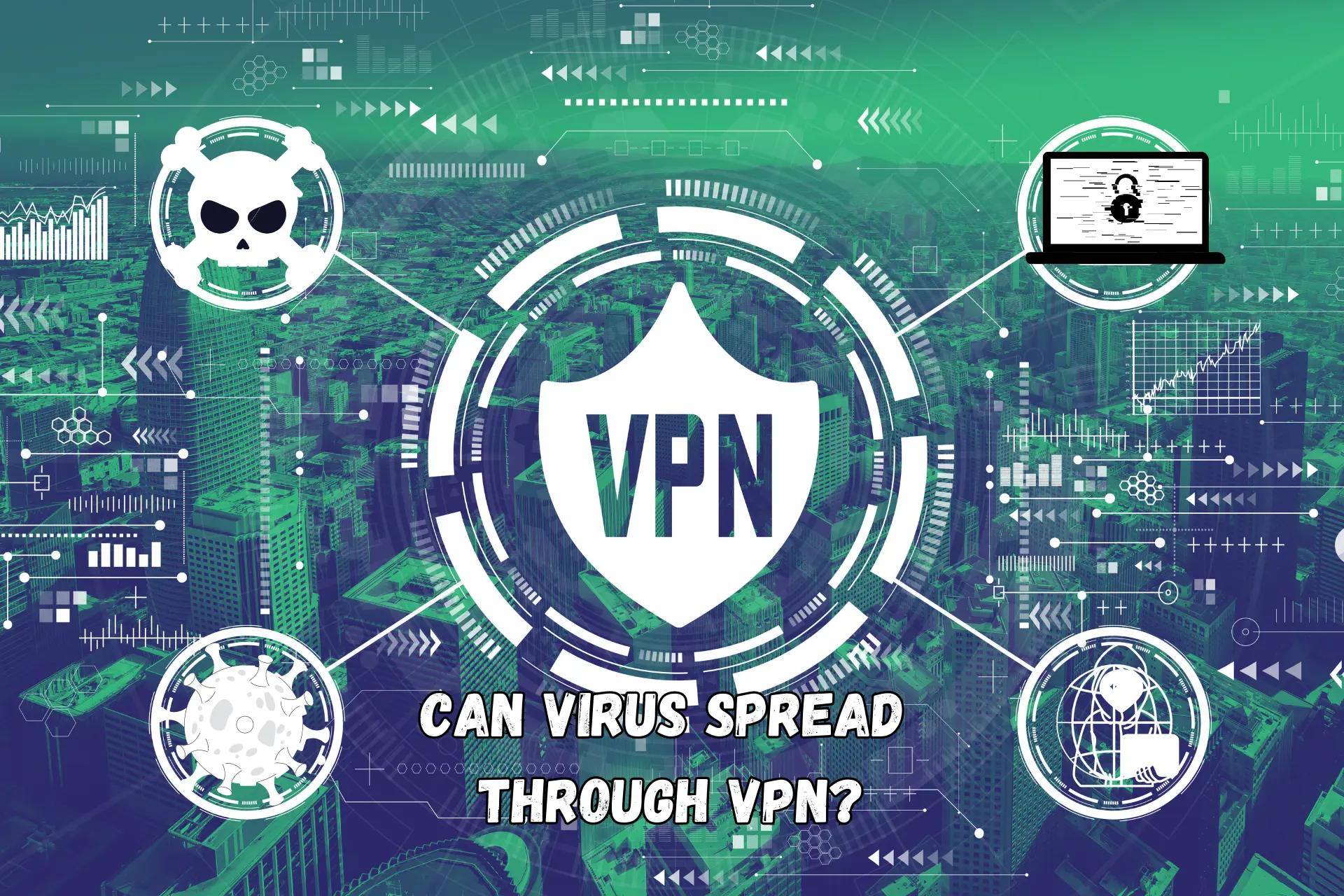Can Virus Spread Through VPN? Here’s The Answer!

You’ve probably heard rumors about a virus spreading through VPN.
Some people say it can happen, while others swear it’s just a myth.
Well, we’re here to set the record straight once and for all.
In this article, we’ll debunk the myth and explain the truth about whether viruses can spread through VPN.
And as a bonus, we’ll also give you some tips on how to stay secure online.
Let’s start.
Can a virus spread through VPN?
No, a virus cannot spread through a secure VPN.
A VPN helps establish a secure network connection that encrypts and protects your data while transmitting it over the internet.
In a nutshell, it focuses on enhancing privacy, anonymity, and security rather than being a virus transmission medium.
⚠️ However, when the VPN is hacked, there’s a possibility of such.
For example, in October 2022, the computer network of a Canadian college and a global investment firm fell victim to a ransomware attack.
This happened when hackers gained unauthorized access to the VPN of Fortinet devices.
Also, remember that a VPN is not an antivirus. So a virus can still infect a device even if the VPN is on. It’s all about your behavior as a VPN and internet user.
If you’d like a deeper breakdown of this, check out our guide on whether a VPN can protect your PC from viruses and what else you should do to stay secure.
This includes downloading infected files, clicking on malicious links, or visiting malicious websites.
Now, let’s explain further how VPNs work and what would it take for a virus to spread through them.
Can viruses spread through VPN tunnels?
No, viruses cannot spread through secure VPN tunnels.
A VPN tunnel is a secure, encrypted pathway between your device and a remote server when you connect to a VPN.
Its purpose is to encrypt and encapsulate the data, making it difficult for unauthorized entities to intercept or tamper.
→ Best VPNs employ strong encryption protocols such as OpenVPN or IPSec to achieve that.
Moreover, viruses spread through specific actions, such as downloading infected files, clicking on malicious links, or visiting compromised websites.
These actions occur at the endpoints of the VPN tunnel, on the user’s device, or on the destination server.
The VPN tunnel itself does not inspect or modify the data packets for viruses.
It solely focuses on securely transporting the data between the two endpoints.
What if the VPN is hacked?
When the VPN tunnel is compromised or hacked, malicious actors can use that avenue to spread viruses or ransomware.
For instance, in June 2022, the FBI and other agencies alerted healthcare providers about increased Daixin Team ransomware attacks and data extortion incidents.
This group has been targeting healthcare providers by encrypting servers that handle electronic health records, diagnostics, imaging, and intranet services.
The agencies are advising healthcare providers to strengthen the security of their VPN servers, as this was the entry point for the group in previous attacks.
They usually exploit an unpatched vulnerability in the victim’s VPN server.
How to stay safe from malware when using a VPN?
To stay safe from malware when using a VPN, there are several important steps to follow:
- Choose a reliable VPN provider
Not all VPNs are created equal. Some may have weak encryption, leaky protocols, or shady logging policies that could compromise your privacy and security.
So, you should choose a VPN that uses strong security protocols, such as OpenVPN or IKEv2, to ensure that your data is properly encrypted and protected.
Also, some VPNs can block ads, trackers, phishing, and malicious websites. While this can enhance your security and privacy, it shouldn’t replace anti-malware.
However, connecting to a VPN with this feature can help prevent some of the most common sources of malware infections.
In addition, A VPN with a kill switch may also go a long way to enhance your security.
How? It automatically disconnects you from the internet if the VPN connection drops.
This way, you won’t expose your real IP address or traffic to potential snoopers or hackers.
➡️ Want to get a good deal on a reliable VPN? Check out our exclusive list with the best offers on the market right now! - Keep your devices updated
Another way to prevent malware infections is to keep your software updated.
This includes your operating system, browser, VPN, antivirus, and any other applications you use regularly on your Mac or PC.
Software updates often contain security patches that fix vulnerabilities that hackers or malware could exploit.
So, when you update your software regularly, you reduce the risk of being exposed to new or unknown threats. - Avoid clicking on suspicious links or attachments
One of the most common ways to get infected by malware is by clicking on links or attachments that contain malicious code.
This is because phishing attempts and malicious links can bypass VPN security measures, making you vulnerable to malware
These could be sent to you via email, social media, or instant messaging apps, often disguised as something legitimate or enticing.
❗ If you are unsure about the source or the content of a link or attachment, do not click on it.
You should also be careful when you visit websites known to harbor malware, such as torrent sites or illegal streaming platforms.
Overall, regardless of whether you use a VPN, be cautious when downloading files or software from the internet.
Stick to trusted sources and scan files with an updated antivirus program before opening them to mitigate the risk of malware infections. - Enable firewall protection
Firewalls act as a gatekeeper, monitoring the incoming and outgoing network traffic. They scrutinize the data packets, examining their source, destination, and content.
This diligent inspection enables it to identify and block suspicious connections, effectively thwarting potential malware attempts from infiltrating your device.
When your device is connected to a VPN, the firewall complements the encryption provided by the VPN tunnel.
While the VPN encrypts your data and ensures its secure transmission, the firewall acts as a proactive filter, preventing malicious entities from accessing your system.
Firewalls also regulate outbound connections, preventing malware from communicating with command-and-control servers or spreading further.
In short, firewalls can significantly reduce the risk of malware infecting your device. - Use anti-malware software along with your VPN
One of the things a VPN cannot do on its own is to protect you from malware. That is the job of an antivirus.
It scans your system and web traffic for threats and stops them before they can infect your device.
Antivirus software can also help you remove any malware that may have slipped through your VPN’s defenses.
So, you should use both a VPN and antivirus software to ensure maximum protection online.
Most importantly, regularly scan your system to ensure there are no hidden viruses or malware present. - Backup your data regularly
One of the most devastating effects of malware is losing your data. Some malware can delete, encrypt, or corrupt your files, making them inaccessible or unusable.
To avoid this, you should back up your data regularly to an external drive or a cloud service.
This way, you can restore your data in case of a malware attack or any other disaster.
You should also keep your backups updated and test them periodically to make sure they work. - Educate yourself about the latest malware threats
Finally, one of the proactive measures to prevent malware infections is educating yourself about the latest malware threats and how to avoid them.
As they say: knowledge is power.
You can follow reputable security blogs, newsletters, podcasts, or social media accounts that provide timely and accurate information about malware trends, attacks, and prevention tips.
Also, you should take advantage of online courses or resources that teach you the basics of cybersecurity and how to protect yourself online.
Being well-informed and proactive in your approach to online security can significantly enhance your overall protection, even when using a VPN.
Summary
So, to summarize, can a virus spread through VPN?
No, viruses cannot spread through secure VPNs or VPN tunnels.
However, in case someone hacks a VPN, it may spread viruses. But that doesn’t really happen.
Fortunately, if you follow the above tips, you can stay safe from malware and virus.
Ultimately, you’ll enjoy the benefits of a VPN while ensuring your online safety and peace of mind.
Read our disclosure page to find out how can you help VPNCentral sustain the editorial team Read more






User forum
0 messages